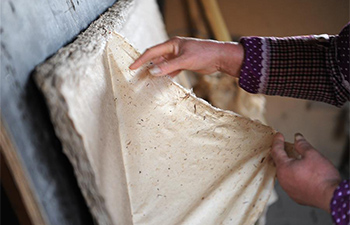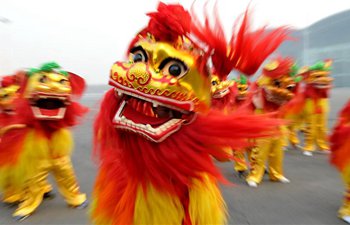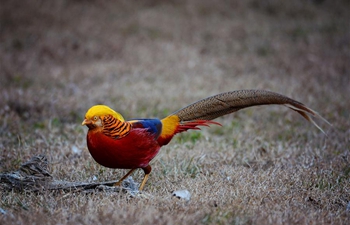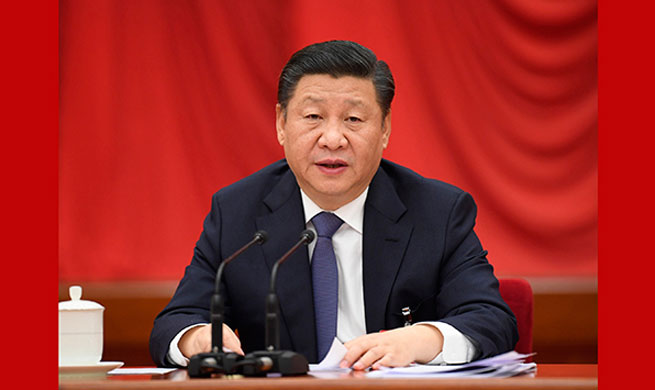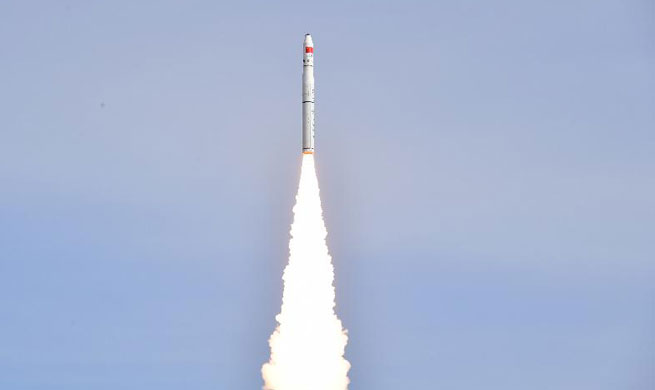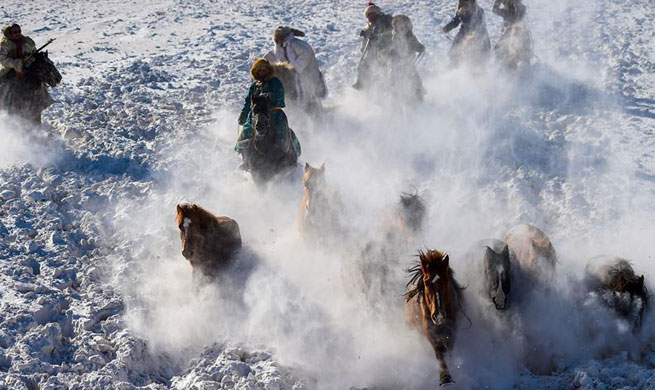
A Turkish tank arrives at an army base near the Turkish-Syrian border in Hatay Province, Turkey, Jan. 18, 2018. Turkish army dispatched tanks and armored vehicles to its southern border province Hatay on Thursday as preparation of a possible military action into Syria's Afrin, state-run Anadolu Agency reported. (Xinhua)
by Hummam Sheikh Ali
DAMASCUS, Jan. 19 (Xinhua) -- When the Islamic State (IS) was in its best shape, the international efforts were focused on the battles to defeat the terror-designated group.
But following the near-defeat of the IS in Syria late last year, the international players in the Syrian conflict have put their differences on the table in northern Syria.
The U.S.-backed Syrian Democratic Forces (SDF), an alliance of Kurds, Arabs and Assyrians, declared their victory on the IS in its de facto capital of Raqqa late last year, while the Russian-backed Syrian army was declaring the defeat of the terror group in the eastern city of Deir al-Zour.
At the time, all players in the Syrian conflict were racing to score a victory in the battles against the IS, but now their differences were laid bare in northern Syria.
The U.S. hopes to consolidate its foothold in Syria by throwing extra support behind Kurdish-led groups such as the SDF and its primary component the Kurdish People's Protection Units (YPG), which emerged as a reliable ally to Washington in Syria's nearly seven-year war.
Such a support, which helped Kurdish groups expand in northern Syria near the Turkish border, has raised the ire of Turkey, which vowed to dampen the Kurdish sway near its border as it fears the separatist sentiment of Syria's Kurds could inspire Turkey's 14 million Kurds.
Despite being long-time allies, the tension between Turkey and the U.S. has grown bigger recently with Washington declaring its willingness to form a 30,000-strong border force from the SDF and other Kurdish groups in northern Syria.
On the other hand, Turkey seemed to have sped up a long-planned military campaign against Kurdish fighters in the Kurdish-led Afrin region in northern Syria near the Turkish border, as Turkey considers the YPG as a terror group given their alliance with the Kurdistan Workers' Party (PKK), which has been active in the southeastern Kurdish areas of Turkey since 1984.
Kurdish activists said the formation of a new border force is likely a prelude to the U.S. recognition of a federal Kurdish rule in northern Syria.
The Syrian Observatory for Human Rights monitor group said the Turkish artillery has been hitting the Kurdish posts in Afrin for a week.
On Friday, Turkish Defense Minister Nurettin Canikli said Turkey's operation in Afrin has "de facto" begun with cross-border shelling.
Meanwhile, a U.S. State Department official said the Turkish threats of a military offensive in Afrin is "destabilizing."
"We do not believe that a military operation serves the cause of regional stability, Syrian stability or indeed Turkish concerns about the security of their border," the official was cited as saying.
Syrian Deputy Foreign Minister Faisal Mekdad warned that his country will respond militarily to any Turkish military campaign in northern Syria.
Mekdad said the Syrian air defense forces have completely recovered and are ready to destroy Turkish warplanes in Syria's airspace.
"Afrin in particular as well as the northern and northeastern regions have always been and will always be Syrian territories," said Mekdad.
Damascus, however, also has issues with the Kurdish forces, particularly after the reports about the new U.S.-backed border force.
On Monday, the Syrian Foreign Ministry slammed the U.S. bid to form an armed militia in northern Syria as a flagrant violation of Syria's sovereignty.
"The U.S. action comes in the framework of its destructive policy in the region to fragment the countries and spur tensions to hinder any solution to the crisis," the ministry said.
Meanwhile, the ministry warned that it will regard any Syrian citizen taking part in the U.S.-backed militia as a "traitor."
The ministry called the new U.S. move as a "renewed conspiracy" that will be brought down by the Syrian army.
Russia, a major international ally of the Syrian government, also said the United States has no intention of preserving the Syrian sovereignty.
"The U.S. actions that we have been observing indicate that the U.S. does not want to keep Syria as a state in its current borders. The U.S. wants to help the Syrian Democratic Forces to set up some border security zones," Russian Foreign Minister Sergey Lavrov said on Monday.
While Russia has a good relationship with the Kurds in Syria, Turkish Chief of General Staff Hulusi Akar flew on Thursday to Moscow for a meeting with his Russian counterpart Valery Gerasimov.
Local media said the meeting aims to seek support from Moscow in Turkey's military operation in Afrin.
Anas Joudeh, the head of the Nation Building Movement, told Xinhua that the situation in northern Syria witnesses "an intensification of political conflict" as each party is trying to secure its agenda ahead of any political settlement or talks.
But he did not expect any major military campaign by Turkey in Syria.
"I don't see a Turkish military campaign on Afrin I don't think it will develop into a military campaign, I think it's more of a political campaign than a military one," he said.
Ayham Muhammad, a political analyst and a journalist, told Xinhua that the Syrian government has already expressed its total rejection to the Turkish campaign in Afrin, because the move could be a prelude for Turkey to get closer to Aleppo and Idlib provinces in the long run.
"The Turkish campaign is rejected by the Syrian government because Afrin is a Syrian territory and the Turkish presence inside Afrin is dangerous to Aleppo and Idlib," he said.




